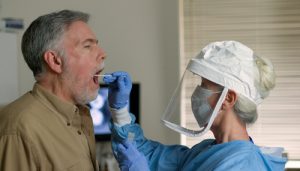
U.S. Sen. Roger Wicker (R-MS) led a bipartisan group of 40 other U.S. senators in calling on their chamber’s appropriators to support community health centers in the next COVID-19 relief package.
“Community health centers are vital to our response to the coronavirus pandemic and need appropriate funding to continue their front-line healthcare work,” wrote Sen. Wicker and his colleagues in a June 5 letter sent to U.S. Senate appropriations committee leaders.
Such centers provide affordable care to more than 29 million Americans, including 385,000 U.S. military veterans and 8.7 million children nationwide, according to their letter, which was also led by U.S. Sen. Debbie Stabenow (D-MI). Also signing the letter were U.S. Sens. Thom Tillis (R-NC), Martha McSally (R-AZ), John Hoeven (R-ND), Cory Gardner (R-CO), Deb Fischer (R-NE), and Steve Daines (R-MT).
“These centers play a critical role in responding to the pandemic, offering coronavirus testing, primary care, dental care, behavioral health care, and other services to our nation’s most vulnerable patients,” wrote the lawmakers. “This care helps keep individuals out of emergency rooms, where beds are currently in particularly high need. It also helps manage chronic conditions that may exacerbate the symptoms of COVID-19.”
However, additional emergency funding is needed for community health centers across the country, where more than 2,000 already have had to close their doors, with many others also on the brink of closing, according to their letter.
“Over the next six months, community health centers will see 34 million fewer appointments as Americans cancel primary and preventive care appointments or delay non-essential care,” Sen. Wicker and his colleagues wrote. “Health centers are anticipating $7.6 billion in lost revenue and 105,000 lost jobs.”
And despite the additional $2 billion in emergency funding provided to community health centers in recent COVID-19 response and relief packages, health centers remain concerned about how to keep their doors open, wrote the senators.
“Additional funding is critical for these centers to continue providing quality, affordable health care and front-line response efforts,” they wrote.



